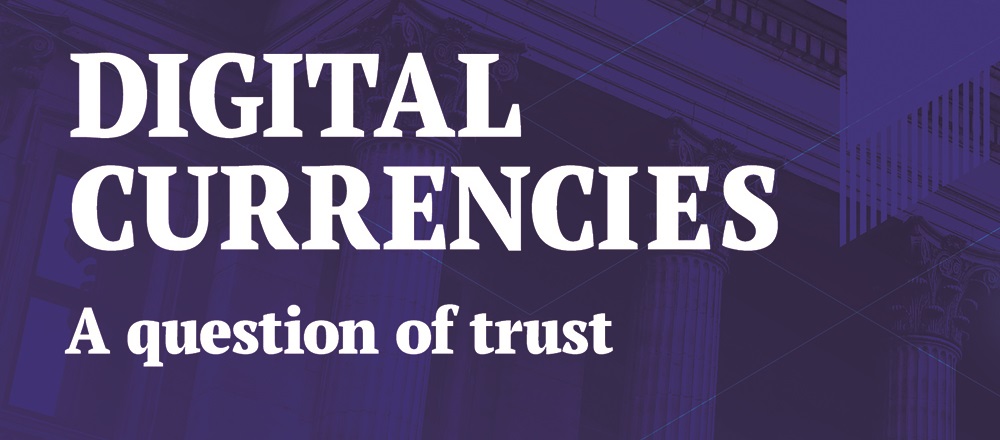
Central Banks Cannot be Hands-off as the Technology Develops
The Group of Thirty (G30) published Digital Currencies and Stablecoins: Risks, Opportunities, and Challenges Ahead, the report on its study of digital currencies. The G30 report makes clear that decisions by regulators on how to deal with digital currencies, now and over the next few years, could shape the global financial system for decades to come.
The report also includes a definitive description of the digital currency that will be issued by the People’s Bank of China.
“The contours of the digital currency landscape are evolving rapidly. Digital currencies have significant benefits, but if poorly executed or overseen, they may also put at risk user funds and data privacy. Policymakers need to approach these transformative technical developments with their eyes open, conscious of opportunities but also aware of possible pitfalls,” said Co-Chair of the G30 Working Group on Digital Currencies, Dr. Raghuram Rajan, Professor of Finance, Chicago Booth School of Business.
The G30 report highlights the key issues that policymakers have to consider in responding to these developments. These include:
1. Central Banks and Finance Ministries must play an active leadership role in setting standards and providing public infrastructure for payments, which cannot be left to market forces alone.
2. New technologies may require a sufficiently long phase-in period in order to be tested fully. Multiple payment alternatives should be introduced so that the payments system gains a measure of resilience and includes adequate competition.
3. Existing technologies that allow faster retail payments, which drastically increase competition and lower costs to businesses and consumers, should be implemented more widely.
4. Policy consideration of a direct (full retail) central bank digital currency (CBDC) should take into account the possible concentration of risk, disintermediation of traditional lending institutions, and excessive government control of credit allocation, which would be counterproductive in today’s diverse modern economies.
5. Before implementing any type of CBDC, its impact on various aspects of the economy should be evaluated very carefully, among them its effect on monetary policy transmission, on the safety and integrity of the financial system, and on the emergence of alternative options such as indirect/hybrid CBDCs.
6. As the payments system becomes more digital, it will be important to find a balance between the protection of individual data and privacy versus the government’s imperative to enforce laws, regulations, and taxes. The issues in payments need to be examined holistically, along with other privacy concerns arising from data gathering by banks, large tech companies, and governments.
7. Importantly, the increased cross-border use of digital currencies necessitates an international framework for governing data usage and exchange.
Co-Chair of the G30 Working Group on Digital Currencies, Dr. Kenneth Rogoff, Professor of Economics, Harvard University, said: “Paper currency has become increasingly marginalized in legal, tax-compliant transactions across much of the world, save for low value payments, where it is also on the decline. How and in what form the transition to digital currencies is managed and supervised will affect governments, central banks, and payment systems users. The time has come for the official sector to play a more decisive role in shaping these developments to ensure efficiency, security, stability, and financial inclusion.”
Tharman Shanmugaratnam, Chairman of the G30, said: “The G30 sets out the key considerations for policymakers in deciding how digital currencies should be designed and implemented, so as to achieve their potential to bring about cheaper and faster cross-border payments, financial inclusion, and help root out illicit finance.”
Dr. Rajan and Dr. Rogoff co-chaired the study, supported by seven G30 members. Darrell Duffie, Adams Distinguished Professor of Management and Professor of Finance, Stanford Graduate School of Business, and Hyun Song Shin, Economic Advisor and Head of Research, Bank for International Settlements, served as project advisors.
The Group of Thirty is an independent global body comprised of senior representatives of the public and private sectors and academia. The Group aims to deepen understanding of international economic and financial issues, to explore the international repercussions of decisions taken in the public and private sectors, and to examine the choices available to market practitioners and to policymakers. The Group was established in 1978, and is led by Jacob A. Frenkel, Chairman of the Board of Trustees, and Tharman Shanmugaratnam, Chairman of the Group.
Banking 4.0 – „how was the experience for you”
„To be honest I think that Sinaia, your conference, is much better then Davos.”
Many more interesting quotes in the video below: